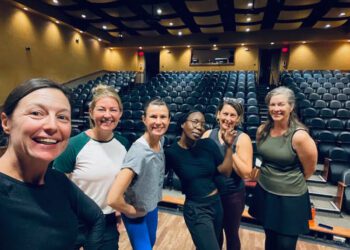20 resort tax applicants discuss future plans at Feb. 11 town hall meeting
By Emily Stifler Explorebigsky.com Managing Editor
BIG SKY – The Montana Room at Buck’s T-4 was packed with movers and shakers from the Big Sky community on Feb. 11 for the second of two town hall meetings hosted by the Big Sky Resort Tax Board.
“We have a community here of really decentralized government,” said resort tax board member Mike Scholz in his introductory speech. He pointed to the 20 organizations present that night, most of which are applying for resort tax funding this year.
“We really work through all of these organizations in trying to give a collective vision by having these meetings … The resort tax board appropriates money to help you out … We don’t decide what happens in this community, we just help fund it.”
A leader from each organization gave a five-minute presentation on the group’s mission and upcoming projects, with opportunity for comment from the public and the resort tax board.
The RTB also mentioned an organizational survey collected from applicants, which shows cash flow requirements for each over the next three years, as well as future projects.
It gave “a clear sense of where the community will be in the next four years,” said RTB chairman Les Loble. “It also shows that certain organizations’ responsibilities and desires overlap,” he said, using the Big Sky Community Corp. and the Big Sky Skating and Hockey Association as examples.
Both are looking at building major recreational centers – an aquatic center and an indoor skating arena/concert facility – and Loble suggested there might be room for collaboration.
“From a community-wide perspective, most major ski resorts – the ones that compete with Big Sky – have ice facilities,” said Gary Hermann, representing the BSSHA. “[These are] permanent, enclosed facilities that they use for many things.” BSSHA is looking for private funding, Hermann noted.
A multipurpose facility like this “sounds like a game changer for Big Sky,” commented RTB member Jamey Kabisch. He conjured up a fairgrounds-type setting with an ice skating facility and bleachers to accommodate summer rodeos and concerts. “That’s the kind of thing we’re trying to flush out through this process,” he said.
Another organization envisioning long-term changes was the Big Sky Transportation District, represented by Ennion Williams.
“The goal is to eliminate the empty bus syndrome,” Williams said, noting the group wants to gear the system to better suit tourists. Ideas include a “chuck wagon bus,” to serve restaurants and other businesses by offering door-to-door service, and extending Skyline’s night bus service to 2 a.m. to reduce drunk driving. The group is also looking at other revenue streams.
The Big Sky Food Bank, founded in fall 2012, is a new player this year among resort tax applicants. The organization is part of the Gallatin Valley Food Bank, which operates under the nonprofit Human Resources Development Council.
Director Tim Trzinski cited census data that showed a third of Big Sky’s approximately 2,100 residents live below the poverty level. He did the math: The Gallatin Valley Food Bank served 300 people in 2012; the new facility hopes to help the 400 others it hasn’t reached.
“Food banks are here to ensure food security, not only addressing issues of hunger and knowing where the next meal is going to come from, but to lead people on a path out of poverty,” Trzinski said.
He pointed to housing and energy assistance as areas where the HRDC has expertise, and noted a recently established partnership with the local Women in Action, which established a new drug and alcohol counseling service for Big Sky.
“We’re here to listen, to learn about the community and what’s needed. [We want to be] a strong and crucial partner to the success of Big Sky and Gallatin County,” Trzinski said.
In closing, Loble said the evening’s presentations gave “a sense of the breadth and depth of commitment of so many people in the Big Sky to the community and what makes it a wonderful place to live.”
Resort tax applications are due April 3. Following that, the board will hold a question and answer session with applicants on May 8 at 11 a.m., location TBA. The final appropriations will occur on June 12.
The link below leads to a list of results from the organizational survey.
Survey Compilation 2.5.13










